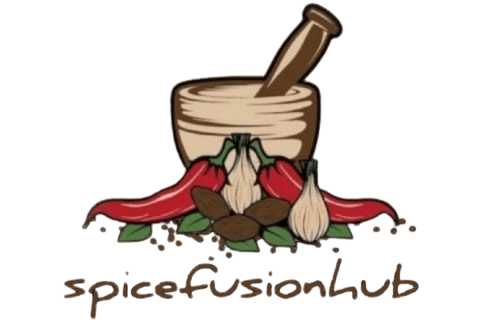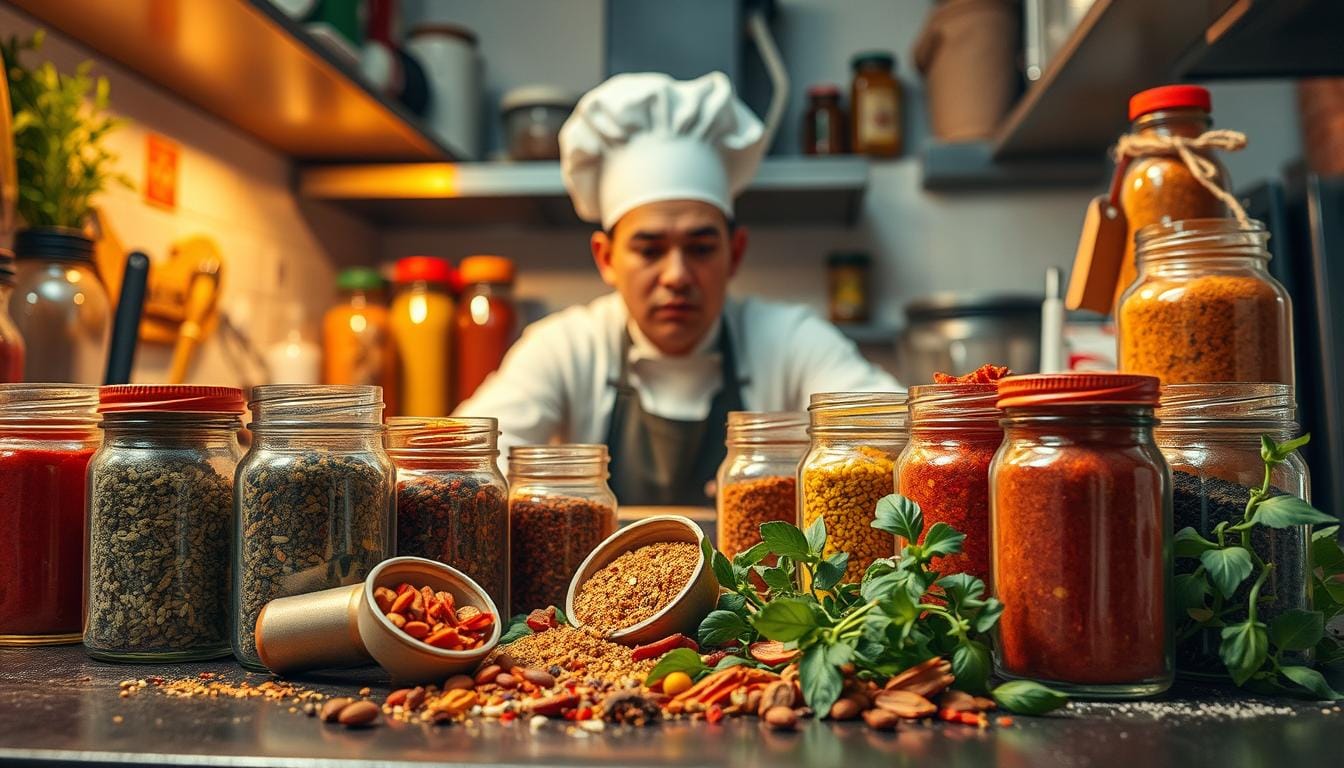Common Spice Mistakes: Steer Clear of These Spice Mishaps
What makes a dish go from delicious to disastrous? Often, it’s the Common Spice Mistakes we make in the kitchen. These mistakes can ruin the flavor and aroma of our meals. Are you unknowingly committing these Common Spice Mistakes? If so, how can you avoid them to take your cooking to the next level?
Key Takeaways
- Avoid overusing spices to prevent overpowering flavors
- Properly store spices to maintain their freshness and aroma
- Be aware of expiration dates to ensure you’re using the best spices
- Understand the difference between whole and ground spices
- Experiment with new spices and seasoning techniques to improve your cooking skills
- Learn to identify and avoid Common Spice Mistakes to elevate your dishes
- Improve your cooking by being mindful of spice usage and storage
1. Overusing Spices: A Flavor Faux Pas
Balance is crucial in cooking. Too many spices can make dishes overpowering and unbalanced. It’s important to know how to balance flavors and avoid common mistakes in spice storage.
To find the right balance, start with small amounts of spices. Then, add more as needed. Also, store spices correctly to keep their flavor and aroma.
- Using too much of a single spice, which can throw off the balance of the dish
- Not considering the flavor profile of each spice and how they interact with each other
- Not storing spices properly, which can cause them to lose their flavor and aroma
By knowing these common mistakes, you can make dishes that are well-balanced and flavorful. This way, you can avoid kitchen spice mishaps and spice storage blunders.
2. Storing Spices Incorrectly
Storing spices right is key to keeping them fresh and flavorful. Many people make mistakes that can ruin their spices. Knowing the best way to store spices is crucial.
Spices need a cool, dry spot, away from sunlight and moisture. This keeps them fresh longer. Using airtight containers also helps preserve their taste and smell.
Don’t store spices near the oven or stove. Heat can make them lose their flavor and smell. Also, keep them away from strong-smelling foods. This prevents them from picking up unwanted odors and tastes.
Optimal Conditions for Spice Freshness
To keep spices fresh, store them in the right conditions. This means a cool, dry place, airtight containers, and away from sunlight and moisture.
Common Storage Mistakes
- Storing spices near the oven or stove
- Storing spices in direct sunlight
- Storing spices in humid environments
- Using containers that are not airtight
Avoiding these mistakes helps prevent issues with spice storage. It keeps your spices fresh and flavorful for longer.
| Spice | Optimal Storage Conditions |
|---|---|
| Whole spices | Cool, dry place, away from direct sunlight |
| Ground spices | Airtight containers, away from moisture and direct sunlight |
3. Ignoring Expiration Dates
Ignoring expiration dates can lead to spice expiration blunders. This results in stale and flavorless spices. It’s crucial to check your spices’ freshness regularly. You can do this by looking at their color and smell.
If they seem dull or smell weak, they might not be fresh anymore. Also, watch out for mold or insects. These signs mean it’s time to throw the spice away to prevent seasoning freshness errors.
How to Check for Freshness
- Check the color and aroma of your spices
- Look for visible signs of spoilage, such as mold or insect infestation
- Check the expiration date on the packaging
Signs Your Spices Have Gone Bad
Look out for these signs: a dull or weak scent, a color change, or visible spoilage. If you see any, it’s time to get rid of the spice. Replace it with a fresh one to avoid spice expiration blunders and keep your dishes flavorful.
4. Using Whole Spices vs. Ground Spices
Choosing between whole spices and ground spices is a common debate. This choice greatly affects the taste and smell of your food. To avoid mistakes, it’s key to know the good points of each.
Grinding your own spices can be a plus. It lets you pick the freshness and quality. But, it takes time and might need extra tools.
Benefits of Grinding Your Own Spices
Some good things about grinding your own spices include:
- Control over freshness and quality
- More vibrant flavor and aroma
- Ability to customize spice blends
When to Choose Whole Over Ground
Whole spices, on the other hand, are easier to use and last longer. They keep their taste and smell better. Plus, they’re often cheaper than ground spices.
In short, picking between whole and ground spices depends on what you like and need. Knowing the pros and cons helps you make better choices. This way, you can avoid mistakes and make tasty dishes.
| Spice Type | Benefits | Drawbacks |
|---|---|---|
| Whole Spices | Longer shelf life, more convenient, less expensive | Less flavorful, less aromatic |
| Ground Spices | More flavorful, more aromatic, customizable | Shorter shelf life, less convenient, more expensive |
5. Timing: When to Add Spices
Timing is key when it comes to adding spices in cooking. The right moment can make a big difference in flavor. But, adding spices too early or too late can mess up the taste.
Spices need to be added at specific times during cooking. For example, when sautéing, add spices towards the end. This helps keep their flavor and aroma. But, when roasting, add spices at the start to let their flavors mix with the dish.
It’s also important to mix fresh and dried spices. Fresh herbs add a bright taste, while dried spices bring depth. Combining both gives your dish a rich flavor.
Cooking Stages That Matter
- Sautéing: add spices towards the end of cooking
- Roasting: add spices at the beginning of cooking
- Simmering: add spices during the cooking process
Balancing Fresh and Dried Spices
Knowing when to add spices and mixing fresh and dried ones helps avoid mistakes. This way, your dish will taste better and be more enjoyable.
6. Using the Wrong Spice for a Recipe
Using the right spices is key to a dish’s flavor and aroma. Spice substitution mistakes can make a dish taste unbalanced and flavorless. It’s important to know how different spices taste and how they work with other ingredients.
Making seasoning freshness errors is another common mistake. This can make a dish lack depth and flavor. To fix this, use fresh, high-quality spices and store them right to keep their flavor and aroma.
- Using paprika instead of cumin in Mexican dishes
- Substituting basil for oregano in Italian recipes
- Using ground ginger instead of fresh ginger in Asian dishes
By being careful and understanding spice tastes, you can make dishes that are full of flavor. This way, you can avoid spice substitution mistakes and seasoning freshness errors.
7. Relying on Spice Blends
Using spice blends can be easy, but it might lead to flavor problems in your kitchen. These mixes save time but can limit your control over taste.
Storing spices wrong can make them lose their taste and smell. Keep them in a cool, dry spot, like a spice rack or drawer. This prevents flavor loss.
Making your own spice blends can help you avoid flavor issues. Here are some advantages:
- Customization: You can adjust the flavors to your liking.
- Flexibility: You can change the spice amounts as needed.
- Cost-effective: Buying spices separately can save money.
Knowing the good and bad of spice blends helps you avoid mistakes. By making your own, you can improve your cooking.
| Spice Blend | Ingredients | Benefits |
|---|---|---|
| Curry Powder | Turmeric, coriander, cumin, cinnamon | Warm, aromatic flavor |
| Italian Seasoning | Basil, oregano, thyme, rosemary | Savory, herbaceous flavor |
8. Not Tasting as You Cook
Tasting as you cook is key to avoiding seasoning mistakes. It helps ensure your dish tastes balanced and delicious. You need to understand how spices and seasonings work together.
Many cooks forget to taste their food while cooking. This can make the dish too salty or spicy. To fix this, taste your food often and adjust the seasoning. Just a pinch of salt or a sprinkle of herbs can make a big difference.
Here are some tips for tasting effectively:
- Taste your food as you go, adjusting the seasoning and spices as needed
- Use a variety of spices and seasonings to add depth and complexity to your dishes
- Don’t be afraid to experiment and try new flavors and combinations
By tasting regularly and using different spices, you can avoid seasoning mistakes. This way, you’ll make dishes that are sure to impress.
| Common Spice Mistakes | How to Avoid |
|---|---|
| Seasoning overuse errors | Taste as you go, adjust seasoning accordingly |
| Spice expiration blunders | Check expiration dates, store spices properly |
9. Hesitating to Experiment
Not trying new spices in cooking can make your dishes boring. It’s key to be creative with spices to avoid mistakes. Try mixing different spices and flavors to spice up your meals.
For example, mix sweet spices like cinnamon with savory ones like cumin. This mix can make your food more interesting. Also, try different cooking methods like grilling to enhance spice flavors.
Stir-fries, curries, and stews are great for experimenting with spices. They let you mix various spices and flavors. This way, you can make your cooking more creative and avoid mistakes.
Encouraging Creativity with Spices
To be creative with spices, explore different blends and flavors. Look for inspiration in cookbooks, online, or at spice markets. Don’t hesitate to try new spices and mixtures. Remember, experimenting is the best way to avoid mistakes.
Popular Dishes to Try New Spices
- Stir-fries: Mix soy sauce, ginger, and chili flakes for a spicy flavor. This avoids common mistakes.
- Curries: Use different spice blends like curry powder and turmeric. This makes your dish unique and avoids mistakes.
- Stews: Add thyme, rosemary, and bay leaves for a hearty stew. This avoids spice blunders.
Trying new spices and flavors can make your cooking exciting. Remember to have fun and don’t be afraid to try new things. Experimenting is all about learning and enjoying the process.
10. Forgetting to Toast Spices
Toasting spices can really boost the taste and smell of your food. But, if you forget, your dishes might lack flavor and smell. To avoid this, learn why toasting spices is good and how to do it right.
Some benefits of toasting spices include:
- Enhanced flavor: Toasting spices brings out their natural oils, resulting in a more intense flavor.
- Improved aroma: Toasting spices releases their aromatic compounds, filling the air with a savory scent.
- Increased freshness: Toasting spices can help prevent seasoning freshness errors by preserving their natural flavor and aroma.
To toast spices, just heat them in a dry pan over low heat, stirring often, until they smell great. This easy step can greatly improve your dishes’ taste and smell, helping you avoid mistakes with spices.

By using toasted spices in your cooking, you can make your dishes more interesting. So, remember to toast your spices next time you cook. Enjoy the better taste and smell they add to your meals.
11. Using Expired Recipes
Using old recipes can lead to bad results in the kitchen. To avoid seasoning errors and spice substitution mistakes, keep up with new spice trends.
Updating Your Spice Knowledge
Refreshing your spice knowledge is key. Try new spice blends and ingredients. Stay updated on culinary innovations. This way, you can make your favorite dishes exciting again.
Learning from Recent Trends in Cooking
Watching cooking trends can spark new ideas. With global cuisines and plant-based diets on the rise, you can explore new flavors. This makes cooking in your kitchen more exciting.







